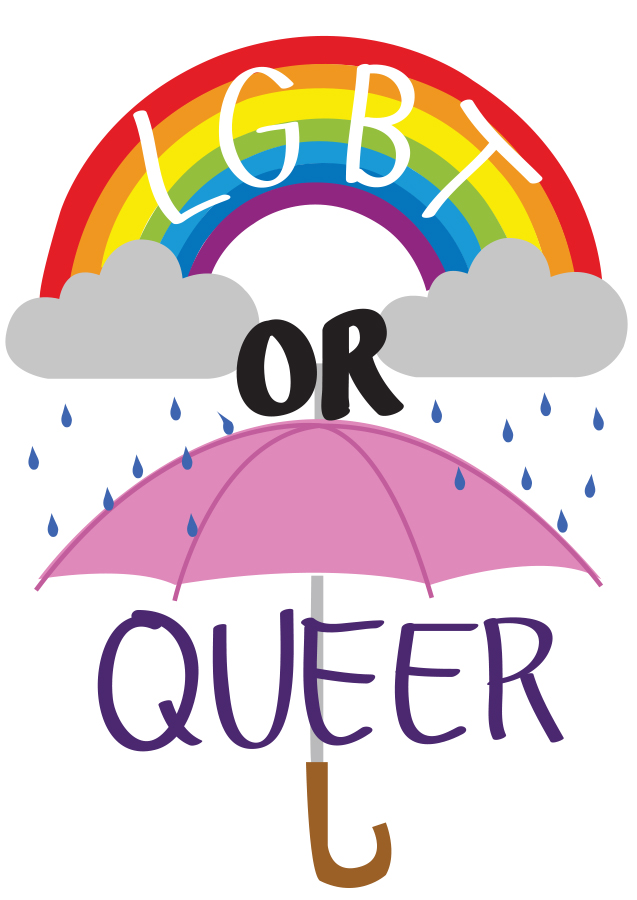Graphic by Liana Kindler
The increasingly popular use of “queer” has become an area of contention in many LGBT communities. On one hand, “queer” has a historically negative connotation, carrying with it the weight of both collective and personal marginalization and trauma. On the other, some choose to identify as “queer” because they see it as a liberating opportunity to work through this pain in a spirit of self-determination.
Often, there is a generational gap when it comes to the interpretation of “queer” in a modern context. For many people who have lived through decades when “queer” was used primarily to shame people, hearing a member of the younger generation voluntarily adopt it is shocking and may even be offensive.
I had this debate with my friend Mary the other day. When I mentioned my involvement in “queer student organizations” at UCLA, she interjected abruptly, as if she had been waiting for a chance to ask, “Ok, so, I don’t get it. What is ‘queer’?”
Rather than dismiss Mary’s confusion, I wanted to explore this generational chasm. At UCLA, “queer” generally carries positive meaning and is commonly used within LGBT communities as an umbrella term for the spectrum of LGBT identities. Queer Alliance, for example, is a coalition of eight queer UCLA student organizations that hosts campus-wide events such as National Coming Out Week. Pan Asian Queers is UCLA’s queer Asian Pacific Islander student group. And Queer X Girl provides a space for queer, lesbian, bisexual, and trans women and allies to engage politically and socially on campus.
To some, the acronym “LGBT” is restrictive, as single letters may not adequately embody their complex identities and experiences. In addition, the acronym often places L, G, B, and T at the forefront of public discussions of LGBT rights, transcending other identities that are not visibly represented but rather implied. “queer” allows individuals to champion a state of difference outside the larger heteronormative culture, without the boundaries of aligning with a particular letter. In other words, “queer” empowers people to embrace ambiguity as a freedom of expression.
Others oppose the usage of “queer” for themselves and within their LGBTQ communities. Historically used as a derogatory term, “queer” can evoke many dimensions of trauma: past and current, personal and collective. The word first appeared in the 1500s, used in Scottish to mean “strange, peculiar, eccentric” and in German as quer, meaning “oblique, perverse, or odd”. In 1894, John Sholto Douglas, the 9th Marquess of Queensberry in Scotland, was the first person documented to use “queer” as a derogatory term for a gay person by denigrating “Snob Queers like Roseberry” while referencing his son’s affair with a man.
By the early 1900s, “queer” was circulating through the U.S. as an amalgamation of “strange,” “bad,” and “homosexual.” In 1914, the LA Times published an article about a club “composed of the ‘queer’ people,” where “the ‘queer’ people have a good time”. This marked the popularization of “queer” as a pejorative in mainstream American culture, used to shame and marginalize LGBT individuals or those perceived to be LGBT. It became a verbal tool in policing sexual orientation and gender identity, targeting and harassing any individuals who did not conform to cis- and hetero-normativity. “queer” was often invoked in acts of hostility and violence, such that many LGBT individuals of older generations associate the word “queer” with painful memories of personal attacks they suffered in school, at work, at home, and in public.
At New York Pride in 1990, Queer Nation, an LGBT activist group, published and distributed a leaflet advocating for LGBT people to adopt the term “queer”. They intended to employ their anger and disgust towards oppression of LGBT communities (particularly in the context of the HIV/AIDS crisis, but also more generally in American culture) to catalyze action against oppression of LGBT communities. Since then, the validity of “queer” as a social identity and alternative to “LGBT” has been a controversial topic across LGBT communities.
The pain attached to “queer” is not confined to the past. Many individuals in our own communities still feel its very–palpable hurt today. Though the debate often revolves around generational differences, there are myriad other reasons an individual may decide not to use “queer.” Whatever the reason, their decision is valid.
As people who wish to reclaim the word for our communities, for ourselves, and for future LGBTQ+ individuals, we have a responsibility to be considerate of others who are not ready or do not wish to do so. We should not expect a blanket adoption of “queer” as a community or individual identity label. Most importantly, we should not condemn those who maintain other LGBTQ+ identities because they are just as valid and powerful. Those of us who reserve the right to identify as “queer” must respect others’ right to choose differently.


Great article. Interesting use of etymology to trace the derogatory meaning of the word, queer. GSRM (Gender, Sexual, Romantic Minority) is another umbrella term used as an alternative to LGBTQ+ and queer.
Im feeling queer, but I don’t know say that my family